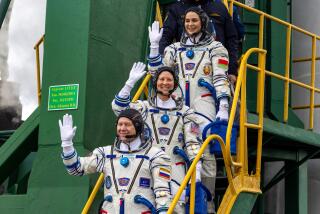Russia Sees More Space Station Woes
- Share via
KOROLYOV, Russia — A top space engineer here advised NASA Administrator Daniel S. Goldin to say a few prayers Wednesday before the launch of Zvezda, the key Russian module of the international space station.
“He probably prayed well, and it helped,” said Vladimir S. Syromyatnikov, chief of the electromechanical department at Russia’s Energiya space company. “It was a perfect, perfect launch.”
But even as the Zvezda module began orbiting Earth, Russian officials were warning of more financial problems ahead, raising fears of further delays for the 16-nation project.
In a bleak note amid the atmosphere of celebration, Yuri I. Grigoryev, deputy general designer at Energiya, warned that Russia will have to revise its plans for deployment of future modules. It will also face problems next year providing space vehicles for launches, he acknowledged.
“I have to admit we have problems with lack of funding, and we will have to change our plans,” he said. “In relation to the seven or eight elements [of the space station], unfortunately, I have to say that work on those modules is frozen.
“So the program on the Russian segments of the international space station should be reconsidered, and we should revise our plans and make adjustments.” he said.
Goldin, attending the launch at Baikonur, Kazakhstan, played the diplomat Wednesday. During a news conference broadcast here at the Russian space facility outside Moscow, he praised Russians for overcoming enormous economic and political difficulties. His comments were a far cry from those he expressed in May 1998, when he voiced frustration and anger at the Russians over delays.
At that time, he told a congressional hearing that he regretted the United States had not built its own version of the Zvezda module, despite Russia’s vast experience in space station design and operation as a result of its Mir project.
“It’s been tough. We’ve been candid,” Goldin said Wednesday. He also predicted problems ahead in the ambitious space endeavor. The project is expected to cost $60 billion by its completion, scheduled for 2005.
“We’re going to have some more problems,” Goldin said after the launch. But he added, “The space station will be built, and then we are going to figure out how people will live and work in space, and we are going to get to Mars.”
Zvezda, the first module fully financed by Russia, cost more than $300 million. Initially scheduled for launch in early 1998, it will provide living quarters and house the space station’s command systems.
In a complex docking operation scheduled for Wednesday, the 43-foot-long, 21-ton module will hook up with the Russian Zarya and the U.S. Unity modules, which have been in orbit since 1998.
The complexity of that maneuver has Russian and U.S. scientists biting their nails.
Vladimir I. Lobachev, chief of the space center here in Korolyov, wiped sweat from his forehead with a handkerchief after the tension of Wednesday’s launch and said he was overjoyed. “But my joy and relief will be far greater after the docking,” he said.
“Our biggest concern now is that we have just one Zvezda and no backup version, and we can’t afford a failure,” he said. “We don’t get a second chance.”
In the 10 minutes between Wednesday’s blastoff and the moment Zvezda reached orbit, the tension at the mission control headquarters at Korolyov was palpable. Two Proton rockets crashed last year, and a minor hitch occurred during a test launch this month.
Syromyatnikov, who advised Goldin to say a prayer, admitted that he said a few himself.
“You pray because a rocket is a special transportation vehicle. . . . Some people forget that it is almost 8 kilometers [about 5 miles] per second in velocity, and how extraordinary it is that this can be achieved and that it can be precise in time and place.”
Russia will send a crew into orbit to manually dock the station if the computer-directed operation fails. Then there will be rapid expansion of the space station, with 15 launches planned in the next 12 months.
*
Sergei L. Loiko of The Times’ Moscow Bureau contributed to this report.
More to Read
Sign up for Essential California
The most important California stories and recommendations in your inbox every morning.
You may occasionally receive promotional content from the Los Angeles Times.













